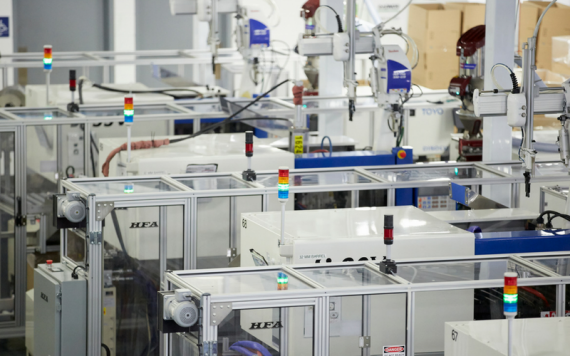
There’s a new revolution taking place in global manufacturing. Are you ready for Industry 4.0?
Industry 4.0, or the fourth industrial revolution, encompasses the automation and data exchange in manufacturing plants – digitising all physical assets and the integration into digital ecosystems with value chain partners. This is in contrast to Industry 3.0, which focused on the automation of single processes and/or machines.
For IQMS (now known as DELMIAWORKS) customers, supply chain integration, automation and analytics will be a key issue for manufacturers in 2017 as they look to remain competitive in a low-cost global manufacturing environment. IQMS develops leading manufacturing ERP (enterprise resource planning) software and MES (manufacturing execution system) software for the aerospace, assembly, automotive, medical, packaging and plastics sectors.
Steve Bieszczat, IQMS CMO, said in a press release:
“A lot of what we hear about Industry 4.0 today could be considered too advanced for all but the largest manufacturers. However, there are a lot of practical applications within Industry 4.0 from which some of our mid-market customers are already benefiting. In 2017, we want to help other mid-size manufacturers realise similar gains by incrementally applying software functionality that enables an Industry 4.0 approach to their operations.”
The benefits of Industry 4.0 for manufacturers? According to a study by PwC of over 2,000 respondents globally, entitled Industry 4.0: Building the digital enterprise, manufacturers are expecting significant gains from the implementation of Industry 4.0 initiatives: ‘companies expect to reduce operational costs by 3.6% p.a., while increasing efficiency by 4.1% annually’.
Supply chain integration
In today’s global markets, few manufacturers function independently: they work in partnership with suppliers and customers.
This interdependency means that manufacturers are under increased pressure to streamline their business-to-business electronic communications that not only exchange purchase order and shipping data but also forecasts, change orders, production specifications, labels and production data, according to IQMS’ press release.
Cloud ERP software is helping more and more manufacturers facilitate this electronic exchange as the technical barriers are lowered as businesses bring more and more stakeholders into the supply chain. At the same time, machine-to-machine communications are replacing those that previously relied on the involvement of several people.
Mike Hopkins, administration manager at Nissen Chemitec America, said:
“We deliver products just-in-time to our automotive manufacturing customers from our production lines. This gives us a competitive edge that would not be possible without the tight supply chain integration we have with the companies we serve”.
Learn more about how automotive plastics manufacturer, Nissen Chemetic has benefitted from using IQMS.
Automation for today’s skilled workforce
The need for increased cost savings, a shortage of skilled staff and the impact of millennial employees are driving the interest in automating the manufacturing shop floor.
Doug Jobe, Tessy Plastics Virginia director of operations, says:
“If we automate multiple work centres, then we can have fewer skilled people monitoring them. It solves two problems: the need to reduce the labour cost per part to be more competitive and the difficulty in hiring qualified workers.”
At the same time, Ed Potoczak, IQMS director of industry solutions, observes:
“Much of the available workforce is now made up millennials, who trust and expect to take advantage of technology to automate activities and enhance communications. They are bringing new norms into factories across the IQMS customer base. In response, many of these manufacturers are now increasing their use of ERP and MES for automation and mobile technology for communications and collaboration to create an environment that fosters productivity and employee retention”.
Learn more about how injection moulding plastics manufacturer, Tessy Plastics has achieved high levels of success with IQMS.
Analytics for actionable insights
As PwC note in their Industry 4.0: Building the digital enterprise report:
“Customers will be at the centre of the changes to value chains, products and services. Products, systems and services will be increasingly customised to customer needs and many of our survey respondents say they plan to use data analytics to understand and meet them”.
Analytics is at the forefront of Industry 4.0 as mid-market manufacturers recognise the value that can be mined from the data that is a natural by-product of automation and supply chain integration.
Information from electronic orders, digital records of material consumption and production data, and even shipping data can help increase the accuracy of sales forecasts, delivery date promises, and material and workforce resource planning.
Increasingly, in combination with the use of IoT sensors to monitor manufacturing equipment and processes, analytics also are providing predictive data on machine performance and product quality.
Chris Flohr, Spencer Industries extrusion manager, explains:
“We use production and process monitoring to establish production norms. Then, when we see those production metrics trending out of our established boundaries, we can intervene before the problems cause production delays or product quality issues.”
IQMS empowers industry 4.0
Gary Nemmers, IQMS CEO, said:
“Every day we push our customers toward greater supply chain integration, increased automation, and data utilisation to increase the success of their businesses. And conversely, we feel our customers pulling us each day toward the same goals. These manufacturers want to establish themselves as the suppliers of choice, and today that means embracing the ideas expressed as Industry 4.0 and smart manufacturing. That is why our top priority is empowering them to apply these concepts through the comprehensive IQMS products and services they rely on to run their businesses”.
Learn more about DELMIAWORKS’ sector-specific manufacturing ERP and MES software
Posted by Paul on 17th February 2017.

